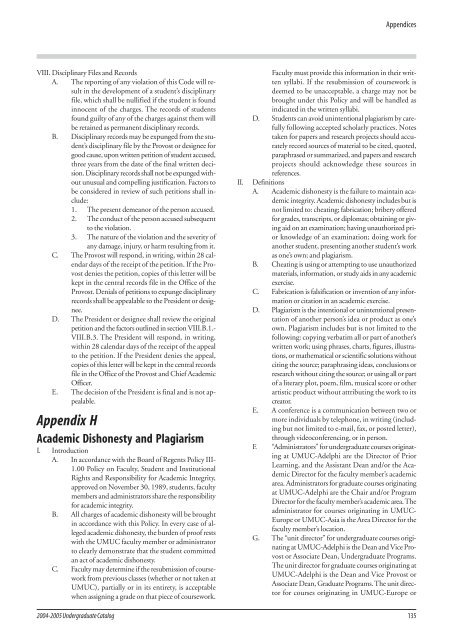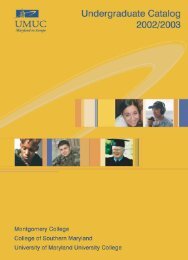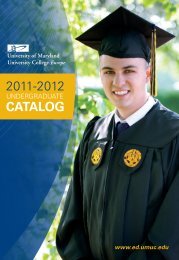Statements of Policy - UMUC Europe
Statements of Policy - UMUC Europe
Statements of Policy - UMUC Europe
You also want an ePaper? Increase the reach of your titles
YUMPU automatically turns print PDFs into web optimized ePapers that Google loves.
VIII. Disciplinary Files and Records<br />
A. The reporting <strong>of</strong> any violation <strong>of</strong> this Code will result<br />
in the development <strong>of</strong> a student’s disciplinary<br />
file, which shall be nullified if the student is found<br />
innocent <strong>of</strong> the charges. The records <strong>of</strong> students<br />
found guilty <strong>of</strong> any <strong>of</strong> the charges against them will<br />
be retained as permanent disciplinary records.<br />
B. Disciplinary records may be expunged from the student’s<br />
disciplinary file by the Provost or designee for<br />
good cause, upon written petition <strong>of</strong> student accused,<br />
three years from the date <strong>of</strong> the final written decision.<br />
Disciplinary records shall not be expunged without<br />
unusual and compelling justification. Factors to<br />
be considered in review <strong>of</strong> such petitions shall include:<br />
1. The present demeanor <strong>of</strong> the person accused.<br />
2. The conduct <strong>of</strong> the person accused subsequent<br />
to the violation.<br />
3. The nature <strong>of</strong> the violation and the severity <strong>of</strong><br />
any damage, injury, or harm resulting from it.<br />
C. The Provost will respond, in writing, within 28 calendar<br />
days <strong>of</strong> the receipt <strong>of</strong> the petition. If the Provost<br />
denies the petition, copies <strong>of</strong> this letter will be<br />
kept in the central records file in the Office <strong>of</strong> the<br />
Provost. Denials <strong>of</strong> petitions to expunge disciplinary<br />
records shall be appealable to the President or designee.<br />
D. The President or designee shall review the original<br />
petition and the factors outlined in section VIII.B.1.-<br />
VIII.B.3. The President will respond, in writing,<br />
within 28 calendar days <strong>of</strong> the receipt <strong>of</strong> the appeal<br />
to the petition. If the President denies the appeal,<br />
copies <strong>of</strong> this letter will be kept in the central records<br />
file in the Office <strong>of</strong> the Provost and Chief Academic<br />
Officer.<br />
E. The decision <strong>of</strong> the President is final and is not appealable.<br />
Appendix H<br />
Academic Dishonesty and Plagiarism<br />
I. Introduction<br />
A. In accordance with the Board <strong>of</strong> Regents <strong>Policy</strong> III-<br />
1.00 <strong>Policy</strong> on Faculty, Student and Institutional<br />
Rights and Responsibility for Academic Integrity,<br />
approved on November 30, 1989, students, faculty<br />
members and administrators share the responsibility<br />
for academic integrity.<br />
B. All charges <strong>of</strong> academic dishonesty will be brought<br />
in accordance with this <strong>Policy</strong>. In every case <strong>of</strong> alleged<br />
academic dishonesty, the burden <strong>of</strong> pro<strong>of</strong> rests<br />
with the <strong>UMUC</strong> faculty member or administrator<br />
to clearly demonstrate that the student committed<br />
an act <strong>of</strong> academic dishonesty.<br />
C. Faculty may determine if the resubmission <strong>of</strong> coursework<br />
from previous classes (whether or not taken at<br />
<strong>UMUC</strong>), partially or in its entirety, is acceptable<br />
when assigning a grade on that piece <strong>of</strong> coursework.<br />
Appendices<br />
Faculty must provide this information in their written<br />
syllabi. If the resubmission <strong>of</strong> coursework is<br />
deemed to be unacceptable, a charge may not be<br />
brought under this <strong>Policy</strong> and will be handled as<br />
indicated in the written syllabi.<br />
D. Students can avoid unintentional plagiarism by carefully<br />
following accepted scholarly practices. Notes<br />
taken for papers and research projects should accurately<br />
record sources <strong>of</strong> material to be cited, quoted,<br />
paraphrased or summarized, and papers and research<br />
projects should acknowledge these sources in<br />
references.<br />
II. Definitions<br />
A. Academic dishonesty is the failure to maintain academic<br />
integrity. Academic dishonesty includes but is<br />
not limited to: cheating; fabrication; bribery <strong>of</strong>fered<br />
for grades, transcripts, or diplomas; obtaining or giving<br />
aid on an examination; having unauthorized prior<br />
knowledge <strong>of</strong> an examination; doing work for<br />
another student, presenting another student’s work<br />
as one’s own; and plagiarism.<br />
B. Cheating is using or attempting to use unauthorized<br />
materials, information, or study aids in any academic<br />
exercise.<br />
C. Fabrication is falsification or invention <strong>of</strong> any information<br />
or citation in an academic exercise.<br />
D. Plagiarism is the intentional or unintentional presentation<br />
<strong>of</strong> another person’s idea or product as one’s<br />
own. Plagiarism includes but is not limited to the<br />
following: copying verbatim all or part <strong>of</strong> another’s<br />
written work; using phrases, charts, figures, illustrations,<br />
or mathematical or scientific solutions without<br />
citing the source; paraphrasing ideas, conclusions or<br />
research without citing the source; or using all or part<br />
<strong>of</strong> a literary plot, poem, film, musical score or other<br />
artistic product without attributing the work to its<br />
creator.<br />
E. A conference is a communication between two or<br />
more individuals by telephone, in writing (including<br />
but not limited to e-mail, fax, or posted letter),<br />
through videoconferencing, or in person.<br />
F. “Administrators” for undergraduate courses originating<br />
at <strong>UMUC</strong>-Adelphi are the Director <strong>of</strong> Prior<br />
Learning, and the Assistant Dean and/or the Academic<br />
Director for the faculty member’s academic<br />
area. Administrators for graduate courses originating<br />
at <strong>UMUC</strong>-Adelphi are the Chair and/or Program<br />
Director for the faculty member’s academic area. The<br />
administrator for courses originating in <strong>UMUC</strong>-<br />
<strong>Europe</strong> or <strong>UMUC</strong>-Asia is the Area Director for the<br />
faculty member’s location.<br />
G. The “unit director” for undergraduate courses originating<br />
at <strong>UMUC</strong>-Adelphi is the Dean and Vice Provost<br />
or Associate Dean, Undergraduate Programs.<br />
The unit director for graduate courses originating at<br />
<strong>UMUC</strong>-Adelphi is the Dean and Vice Provost or<br />
Associate Dean, Graduate Programs. The unit director<br />
for courses originating in <strong>UMUC</strong>-<strong>Europe</strong> or<br />
2004-2005 Undergraduate Catalog 135






